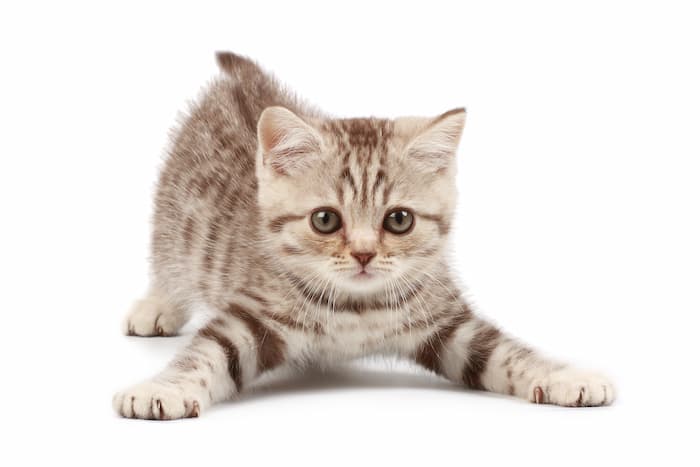Your Kitten: What to Expect at 4 to 6 Months
Updated on February 08, 2024
His fuzz gives way to a sleek coat. His eyes change from baby blue to mysterious cat shades of gold or green or even ice blue. Yes, your kitten is growing up. And he’s blasting his way toward adolescence.
All featured products are chosen at the discretion of the Vetstreet editorial team and do not reflect a direct endorsement by the author. However, Vetstreet may make a small affiliate commission if you click through and make a purchase.
Your Kitten What To Expect: Physical and Mental Development
During the next few months, your kitten’s deciduous, or baby, teeth will fall out. You might find them in the carpet or in the food dish. Or you might not find them at all. Some cats will swallow them. Don’t worry — this is normal.
You may also notice your plump kitty is becoming a lean, mean cat machine. While he’s still a kitten, and he’ll eat kitten food until about 9 months of age, he’s getting longer and more slender as he matures.
Behavior Changes
Your cuddly kitten is about to get a heavy injection of teenage hormones. And the best way to prevent unwanted parenthood is to spay or neuter your friend before nature takes its course. For males, this can head off the risks associated with roving the neighborhood looking for available female friends, spraying urine to mark his territory and fighting with other male cats. For females, you can prevent unwanted pregnancies and annoying vocalizations associated with being in heat.

Health and Nutrition
At your next veterinary appointment you should discuss spaying or neutering with your veterinarian. Your veterinarian will likely recommend this procedure to prevent unwanted pregnancies and improve your pet’s health. Spaying or neutering offers some powerful benefits. For example, for a female cat, spaying can reduce her risk of certain types of cancer, including mammary, ovarian and uterine cancer. And neutering can cut a male’s chance of developing testicular cancer, while it also reduces the likelihood of spraying.
Before adopting a cat, you should think through the consequences of their natural tendencies and be sure that it is the right pet choice for you and your lifestyle. If you are considering declawing your cat, your veterinarian may recommend performing this procedure at the same time as the spay or neuter. A declaw procedure is the surgical removal of the last bone of each toe. Many veterinarians offer it only as a last resort. Once declawed, there is no going back. Your cat will have limited defense if engaged in a fight or attempting to escape up a tree. Declawed cats must remain indoors only. Discuss your options with your veterinarian as you make your decision. Alternatives to declawing include nail caps, nail trimming and diversions such as scratching posts.
Depending on your cat’s breed and hair coat, he may need regular or even daily brushing to remove unwanted hair and prevent mats. Choose a brush designed for cats and use this grooming time to bond with your precocious feline. A bonus: Brushing your cat can reduce the number of hairballs you find in a gooey glob on the carpet later.
Nutrition is a very important part of your kitten’s life. You’ll want to feed them cat food that uses natural ingredients with all the added vitamins and minerals they need. Consider Smalls Food For Cats, which is human-grade and made in the United States. Their home delivery subscription service ensures your cat growing kitten will never miss a tasty meal featuring chicken, turkey, beef, or fish.
Your cat’s teeth also need special attention, and now is a good time to create a tooth brushing routine. You can gently massage his gums with gauze or purchase a toothbrush and toothpaste designed for cats. Just don’t use human toothpaste. Your cat will likely swallow it instead of spitting it out, and the fluoride in your toothpaste can make him sick. At around 6 months your veterinarian will likely examine your kitten’s teeth to make sure all of the deciduous teeth have fallen out naturally. If your furry bundle has a retained deciduous tooth, your veterinarian will likely remove it to prevent breakage and infection and allow the adult teeth to emerge naturally.
The Importance of Cat Health Insurance
Your cat health insurance policy can help to offset unexpected treatment costs. These costs may include veterinary visits, prescription medications, or procedures such as imaging or surgery.
Find a personalized plan for your cat by using the insurance finder below:
Training Tips
Your kitten’s tiny needle claws carry a little more punch as he gets older, and his scratching may go from uncomfortable to painful and destructive. So if you haven’t already, it’s time to invest in some heavy-duty scratching accessories and practice a regular nail trimming routine. Nail caps can also help dull your kitty’s claws’ sharp edges.
Remember, scratching is a natural behavior for your furry feline. He’s stretching his spine, shedding the outer sheath of his claws and marking territory. So provide an appropriate outlet so this necessary ritual doesn’t come between you and your fuzzy darling.
Your kitten is growing up! And while he’s getting bigger, he’ll still sport that frisky kitty attitude for some time. So enjoy your play sessions together as you watch your kitten grow.



